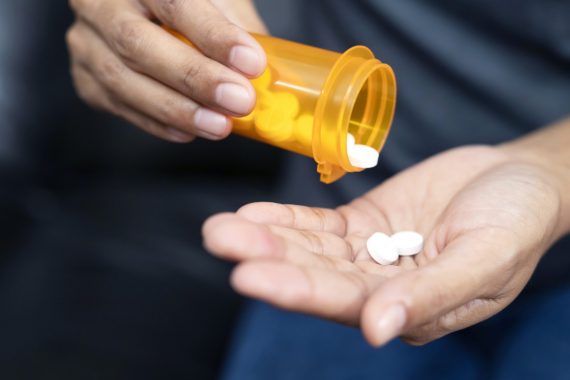DHSC announces plans for expanded addiction services and relaxed naloxone regulations

The Government has announced new plans to improve addiction treatment, including expanding access to opioid overdose antidote naloxone, and growing the medical workforce.
Following a consultation earlier this year, the Government has committed to enabling more professionals, such as nurses and police officers, to provide take-home supplies of naloxone.
Alongside this, NHS England has published its 10-year strategic plan to expand the drug and alcohol treatment and recovery workforce, which will aim to improve training, particularly for roles which are currently unregulated.
Although GPs make up a small proportion of this specialist workforce, the plan said medics are ‘often overlooked and lacking in numbers’ and highlighted that it is ‘vital’ to have GPs and psychiatrists as part of treatment pathways.
It committed to developing a ‘career pathway’ for GPs who want to develop further within this sector, which includes ‘clear supervision’.
The plan also called on alcohol and drug treatment providers to ‘promote a culture of career development for GPs’, and suggested creating a ‘GP support pack’.
NHSE’s strategy comes with a £532m investment and aims to have 800 more medical, mental health and other regulated professionals in the workforce by April 2025.
However, it recognised that the ‘national shortage of medical professionals’ may hold back ambitions to expand the number of medics.
‘It is important to note that there is no quick fix for the lack of medical workforce presence in the drug and alcohol treatment and recovery sector. The training of a medical workforce takes many years, meaning vast improvements in recruitment are unlikely to occur soon or within the scope of this strategic plan.’
According to NHS England, medics make up less than 2% of the current drug and alcohol workforce, which includes just 38 GPs and GP trainees.
Dr Samantha Bhima, clinical lead and GP with extended role in substance misuse at East London NHS Foundation Trust, said commitments like this are ‘very positive thing’ and in her view there should be GPs ‘in every addiction service in the country’.
‘There’s been a long tradition of GPs training and being in drug and alcohol services. However with funding for that training reducing 10 years ago, there’s been far fewer people doing it,’ she told Pulse.
Dr Bhima continued: ‘There is absolutely a role for GPs to do it, because the things that kill people are physical health disorders in the long term – GPs are completely central to that […] I think the client group we look after in an addiction service is fundamentally the same client group we’re very good at looking after as GPs.’
‘GPs have training in managing multiple chronic diseases and being able to support people holistically in a way that is pretty unique for medical professionals,’ she added.
On opioid overdose treatment, the Department of Health and Social Care (DHSC) will update legislation ‘over the next few weeks’ to allow more professionals to supply take-home naloxone, which almost immediately reverses the effect of an overdose.
Currently naloxone can be administered by anyone in an emergency, but can only legally be supplied without prescription by drug and alcohol treatment services.
These changes to the regulations increase access to naloxone so that family members or friends of people known to be using opiates can take it home for future use in the event of an overdose.
In 2022, opioids were involved in almost three-quarters of drug misuse deaths registered in England, and 82% of those in Scotland.
Health secretary Victoria Atkins said opioid addiction is responsible for the ‘largest proportion of drug-related deaths’ in the UK and ‘can ruin lives’.
She said: ‘We are working hard to reduce those numbers by expanding access to naloxone to save the lives of the most vulnerable.
‘Our 10-year workforce plan will expand and boost the training of the next generation of drug and alcohol workers to improve services and support people to get their lives back on track.’
Drug-related deaths have risen to record levels in recent years, with men more likely to die than women.
Visit Pulse Reference for details on 140 symptoms, including easily searchable symptoms and categories, offering you a free platform to check symptoms and receive potential diagnoses during consultations.
Related Articles
READERS' COMMENTS [3]
Please note, only GPs are permitted to add comments to articles












Not GPs, we have enough unfunded stuff to be getting on with for those who work in real world general practice.
‘Not GPs, we have enough unfunded stuff to be getting on with for those who work in real world general practice’.
This comment is just jaded, mindless trolling from someone who cannot be bothered to read. The article highlights £532m of investment and a willingness to train and fund the work for GPs. The doctor quoted describes how well suited to this work GPS are and this real world of drug dependency kills patients and causes misery to their families. It is definitely the real world and picking and choosing who should be our patient is both unethical and unprofessional.
Completely agree Ella. GPs used to do this work when funding was available. I myself was a GPwSI in the field but funding was cut, prescribing has increasingly been delegated to other ‘allied health care professionals’ (in a remarkably similar way to their use today in the wider health service) and over the last decade deaths from drug misuse have rocketed. I wonder why? This group needs health care almost more than anyone and I welcome any suggestion to increase the resources allocated in this area. Its good news indeed